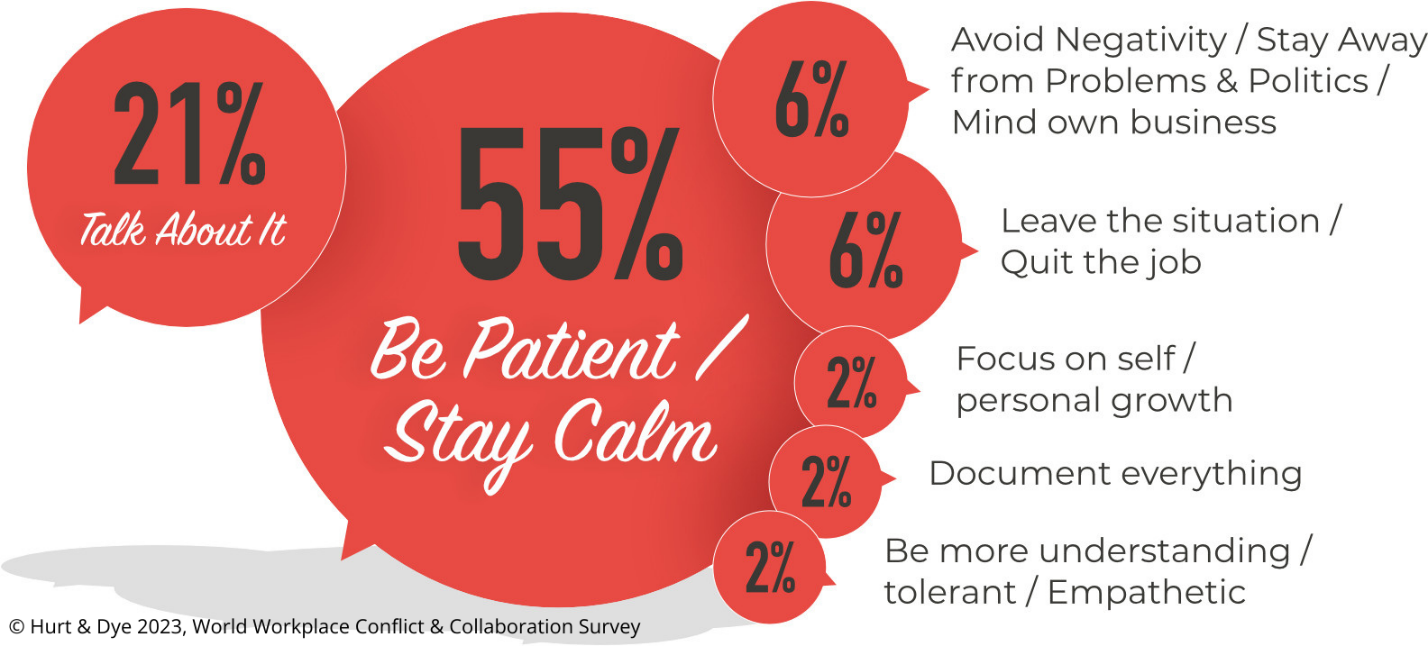When we ask project managers in fast growing, or global tech companies about the biggest source of conflict and frustration in their roles, the answer is almost always the same. “Oh, undoubtedly it’s trying to collaborate in matrixed project teams.” The more complex the organization, the trickier it is for project managers to align stakeholders and to keep decisions moving.
And as if leading projects in a matrix structure were not hard enough, our recent World Workplace Conflict and Collaboration Survey of 5000 respondents in 46 Countries found that workplace conflict is on the rise, 70% reporting experiencing the same or more conflict as in previous years.
One interesting finding in the research was the advice participants would give to their former self if faced with a big workplace conflict again. 21% said they would talk about the situation, or talk about it sooner.
We’re on a mission to make having difficult conversations easier so you can talk about it sooner, for less stress, saved time, and better outcomes.

We’ve put together nine critical questions to help you navigate the increasingly complex challenging of leading project teams in a matrix structure.
Powerful Questions to Build Deeper Trust and Connection in a Matrix Organization
- What will a successful outcome DO for you?
It’s easy to assume that agreement on the success criteria in a project’s scope means that your matrixed project team has a shared understanding of success. By asking “what will a successful outome DO for you,” you invite people to share deeper motivations, desires, and concerns.
- Who are our key stakeholders and who will we involve and include them?
Getting this right as early as possible can save serious time. Talk with your matrixed team and make a map of your stakeholders, and who needs to know what, when, and why. And then, stakeholder your map with them.
It’s better to agree on who you will include before tensions get high, or you’re under pressure to execute quickly. And, as you stakeholder your map, you can look for ways to suggest ways to simplify. Who knows, you might even get an “oh, I don’t need to be involved at that level,” response or two.
- How will we facilitate information flow?
Consider who needs to know what and the best way to communicate. Challenge yourselves to keep everyone informed, so no one is blindsided or barraged with last-minute requests, while at the same time avoiding unnecessary meetings or overwhelming people with details they don’t need.
- What is my role in this project? What’s yours?
Another big source of conflict in matrix project teams is when roles and expectations aren’t clearly defined. I think you’re taking the notes, you don’t think that’s your job. You think you should be the one talking to the customer, I disagree. As with most conflicts, one good conversation about expectations can prevent fourteen “why didn’t you conversations.”
- Who owns this decision?
Another biggie. One of the reasons decision-making is so slow on matrix project teams, is everyone thinks they should own the decision, so no one does. Or, there’s a strong desire to reach a consensus, and every decision requires hours of stakeholdering and escalation.
- What can we do to make this as simple as possible?
Ask this powerful question as much as you can about processes, systems, decisions, and communication for your matrix team.
- Who REALLY needs to be in this meeting?
With the emphasis on “really.” One of the biggest challenges we hear from project managers in matrixed organizations, is there are too many meetings, with too many people. Consider other ways to keep people informed.
- When we can’t agree on a decision, how will we escalate?
This is a vital question to ask BEFORE you need to escalate an issue. Trying to decide how and when it’s appropriate to escalate when tensions are high, inevitably makes the conflict worse. And often, there’s wasted time with different team members escalating to their functional managers with different information, fueling additional conflict and frustration a level above.
Consider asking this question during your chartering process for your matrix team you’re kicking off the project.
- What and how should we celebrate success and key learning?
Taking time to celebrate success as a matrix team and to debrief what you’re learning along the way can make a huge difference in morale and employee development. Consider making time for post-project celebrations where you celebrate what you’ve done and the impact, as well as what you’ve learned.
Talking about these important topics will save you time and the aggravation that comes from misaligned expectations. It’s about making the matrix less ‘Whoa’, and more ‘Wow’, one question at a time.
By Karin Hurt and David Dye, CEO and President of Let’s Grow Leaders and the authors of Powerful Phrases for Dealing With Workplace Conflict: What to Say Next to De-Stress the Workday, Build Collaboration and Calm Difficult Customers.













